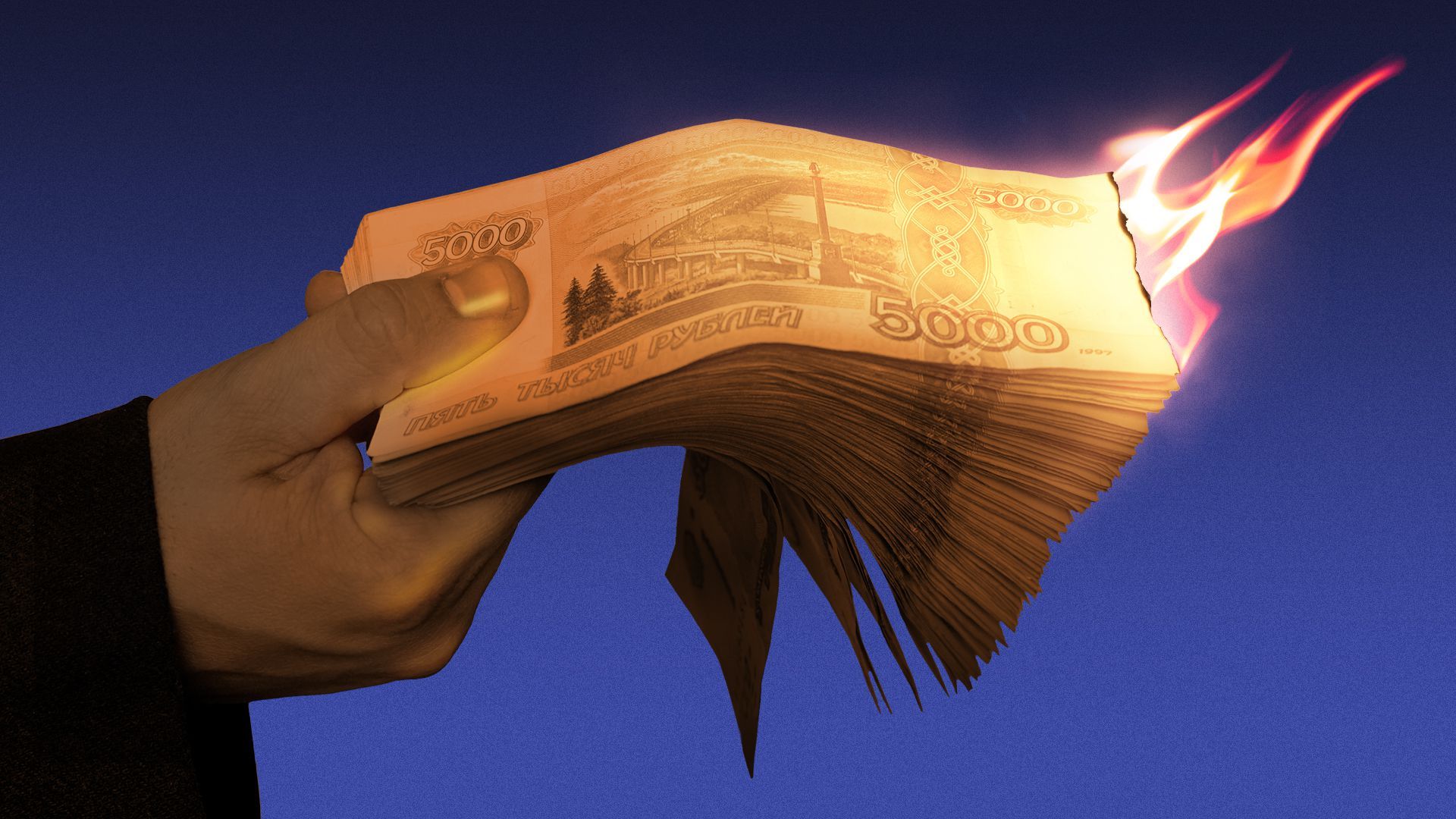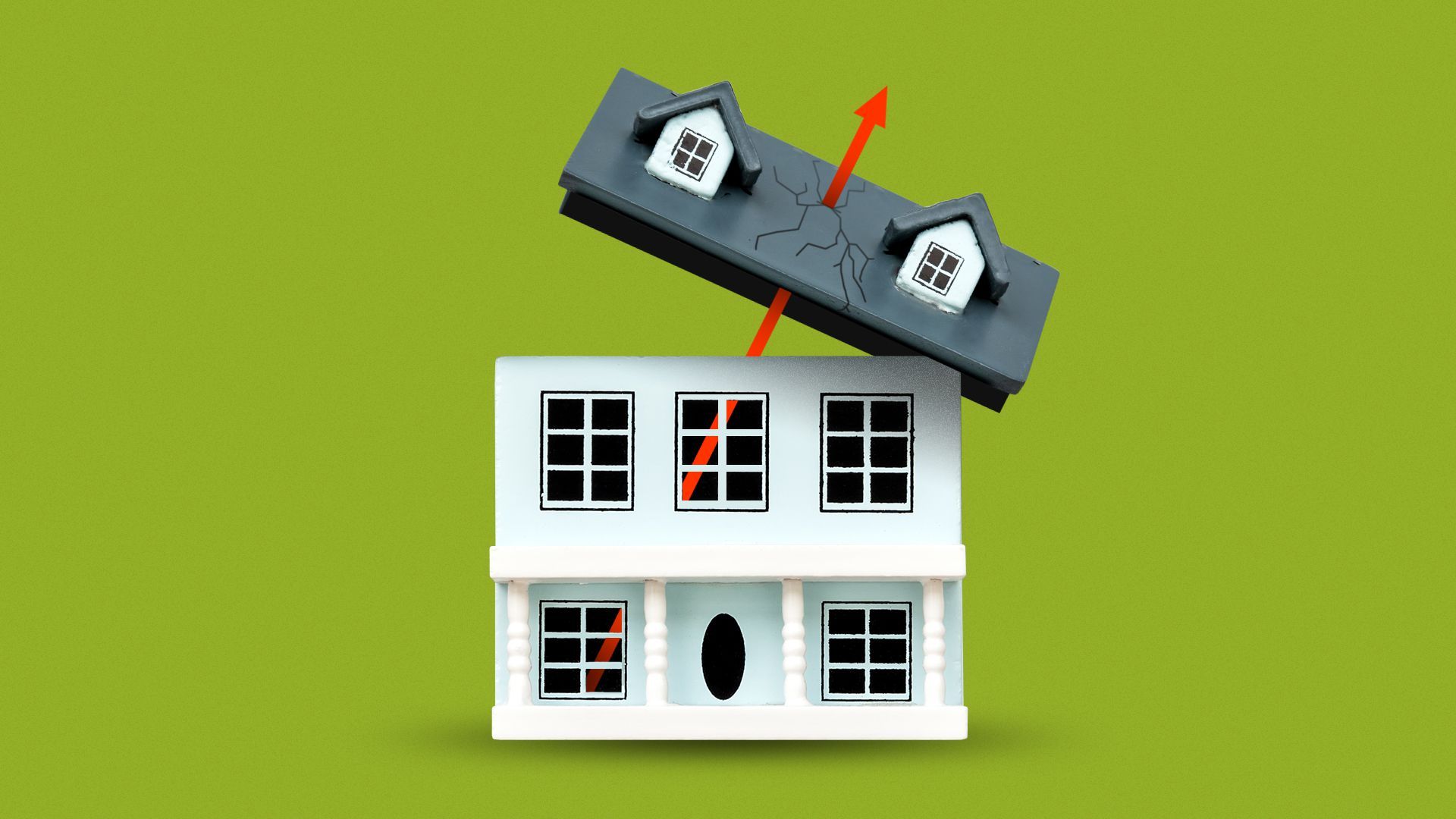| | | | | | | | | | | Axios Markets | | By Matt Phillips and Emily Peck ·Mar 11, 2022 | | Hey now. 🍺 It's Friday. That's family movie night at the old Phillips homestead, which will likely mean another command performance of "Encanto." - But we've got another day to go before we can settle into our couch with our steaming slice of pizza, sweet, sweet beer, and other loved ones.
🎧 Listen: The second episode of "How It Happened: Putin's Invasion" came out this morning. Today's newsletter is 1,010 words, 4 minutes. | | | | | | 1 big thing: Russia was a bad investment |  | | | Illustration: Shoshana Gordon/Axios | | | | With Russia's economy collapsing, its stock market cryogenically frozen and its bonds near default, global investors are set to eat major losses, Matt writes. Why it matters: For decades, Russian investments were a cornerstone of so-called emerging market investing, the financial world's marketing rubric that helped encourage the free-flowing global investments that helped define the post-Cold War era. - Russia was a star of the "BRICS" — a rubric coined by Goldman Sachs analysts that stood for the fast-growing emerging market economies that were investor favorites over the last two decades.
- BRICS = Brazil, Russia, India, China, South Africa.
State of play: It's difficult to estimate how widespread the losses might be. - Goldman analysts estimate there is about $70 billion worth of Russian government bonds held by foreigners.
- A report from the Brookings Institution released last month said there was roughly $200 billion worth of Russian stocks owned by foreigners — including $68 billion in the U.S.
Driving the news: In recent days, major financial players have disclosed — or had the press disclose for them — exposures to such investments that may cause billions in losses in the case of broad-based Russian debt defaults. - BlackRock, the world's largest money manager, has lost roughly $17 billion on Russian securities, the FT reported today.
- Bond-trading giant Pimco could lose up to $2.6 billion if Russia fails to make its sovereign debt payments after the asset manager bet big against default, the FT reports.
- Italy's second-largest bank, Unicredit, said it could lose $8 billion if it has to entirely write off — that is, value as worthless — its Russian business.
- French banking giant BNP Paribas said it has a combined $3 billion in exposure to Russia and Ukraine; Germany's Deutsche Bank has $3 billion; and Credit Suisse, $1.7 billion.
The intrigue: But violent market moves triggered by the Russian invasion — and the massive sanctions in response — have generated steep, and more unexpected, losses elsewhere. - In China, an astounding surge in the price of nickel — in part due to worries about access to supplies from Russia, a top producer of the metal — rocked the empire of Xiang Guangda, the billionaire founder of one of China's largest producers of stainless steel, Tsingshan Holding Group.
Meanwhile, Western corporations will incur losses on foreign direct investments — business investments in Russia — as they rush to exit the market. The bottom line: What a mess. The country's economic meltdown — along with its brutal invasion of Ukraine that has put it in a similar box to North Korea — will likely be seen by historians as the end of the most recent chapter of financial globalization. Go deeper. |     | | | | | | 2. Catch up quick | | 💰Congress passes $1.5 trillion bill to fund government. (Axios) 🇷🇺 U.S. and G7 allies consider revoking Russia's trade status. (Reuters) 🚢 Russian sanctions are causing shipping bottlenecks. (NYT) |     | | | | | | 3. Coal's back |  Data: FactSet; Chart: Axos Visuals Coal, the dirtiest of fossil fuels, is staging something of a comeback, Axios' Kate Marino writes. - Prices for the Australian benchmark are up about 60% since mid-February, as European power plants scour the globe for alternatives to pricey natural gas.
The big picture: Coal-fired electricity generation had been on the decline for a decade, to about 13% of Europe's mix in 2020, as power providers began phasing out the most carbon-heavy fuels. But Europe's energy crisis, which kicked into high gear last year, is breathing new life into the coal market. - For the first time in almost 10 years, coal generation in Europe actually grew in 2021, by about 18%, according to preliminary estimates recently published by Rystad Energy.
What we're watching: Coal prices could rocket even higher in the next few months because Russia is Europe's largest coal supplier, Rystad analysts wrote yesterday. The bottom line: Companies once left for dead — like the recently-bankrupt Peabody Energy — have been resuscitated. Peabody's stock has more than doubled since January, even as the major indexes slumped into corrections. It's up eightfold — from just $3 — over the last year. |     | | | | | | A message from Axios | | Start demanding more from your news | | |  | | | | Axios Pro is here, with deeper reporting and analysis as fast as you need it. Who it's for: If you care about VC, PE, M&A, IPOs, SPACs, or just need the latest industry scoops, Axios Pro is for you. Start your free trial, or learn more about our corporate subscriptions. | | | | | | 4. 🚚 Lots of folks plan to move because of WFH |  | | | Illustration: Annelise Capossela/Axios | | | | In a new survey, 9.3% of respondents — roughly the equivalent of 19 million Americans — said they are planning to move because they can work remotely. Since 2020, 2.4% had already moved because of remote work, Emily writes. Why it matters: The explosion of remote work pushed many professionals out of expensive cities into more remote suburbs and other areas — driving up home prices. This is a big reason no one can find any houses to buy in the U.S. right now. - The survey suggests that demographic shifts sparked by remote work are just getting underway as workers grow more comfortable or secure working at home.
- "The number of people who have relocated is likely just the start of a larger reshuffle," said Adam Ozimek, chief economist at online freelance company Upwork, which ran the survey.
Yes, but: We'll see how many people actually pack up and go. As Ozimek points out, "what people say they will do is typically treated by economists as weaker evidence than what people actually do." |     | | |  | | | | If you like this newsletter, your friends may, too! Refer your friends and get free Axios swag when they sign up. | | | | | | | | 5. Used car prices slip, bucking inflation trend |  | | | Illustration: Eniola Odetunde/Axios | | | | One tiny ray of light for consumers in yesterday's inflation report was a 0.2% dip in used vehicle prices in February, compared to the prior month, Matt writes. The big picture: The Consumer Price Index showed headline prices up 7.9% compared to the prior year, the fastest increase since 1982. - Used cars and trucks were a major driver of last year's sky-high inflation, as disruptions to auto-making — yes, it's supply chains again — kept new cars from making it onto lots.
- Frustrated buyers turned to used cars instead, driving up demand. The surge in used vehicle prices over the last year is still an eye-watering 41.2%.
Yes, but: While the February dip signals that bottlenecks may have been thawing, the supply chain could always seize up again as a result of the Ukraine-Russia situation, which has upended global commodity markets. |     | | | | | | A message from Axios | | Start demanding more from your news | | |  | | | | Axios Pro is here, with deeper reporting and analysis as fast as you need it. Who it's for: If you care about VC, PE, M&A, IPOs, SPACs, or just need the latest industry scoops, Axios Pro is for you. Start your free trial, or learn more about our corporate subscriptions. | | |  | It's called Smart Brevity®. Over 200 orgs use it — in a tool called Axios HQ — to drive productivity with clearer workplace communications. | | | | | | Axios thanks our partners for supporting our newsletters. If you're interested in advertising, learn more here.
Sponsorship has no influence on editorial content. Axios, 3100 Clarendon Blvd, Suite 1300, Arlington VA 22201 | | | You received this email because you signed up for newsletters from Axios.
Change your preferences or unsubscribe here. | | | Was this email forwarded to you?
Sign up now to get Axios in your inbox. | | | | Follow Axios on social media:    | | | | | |











No comments:
Post a Comment